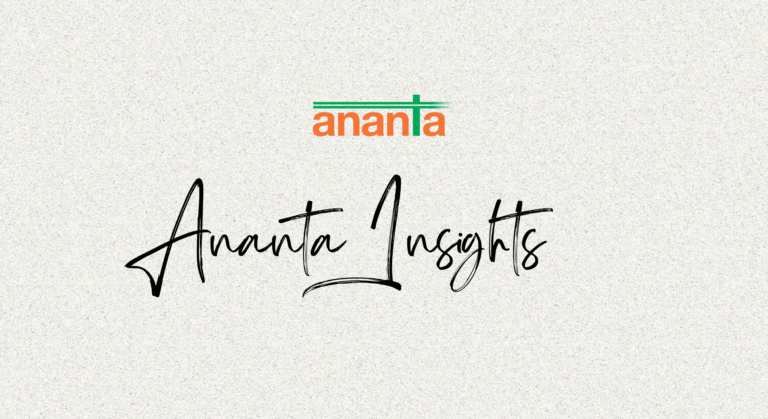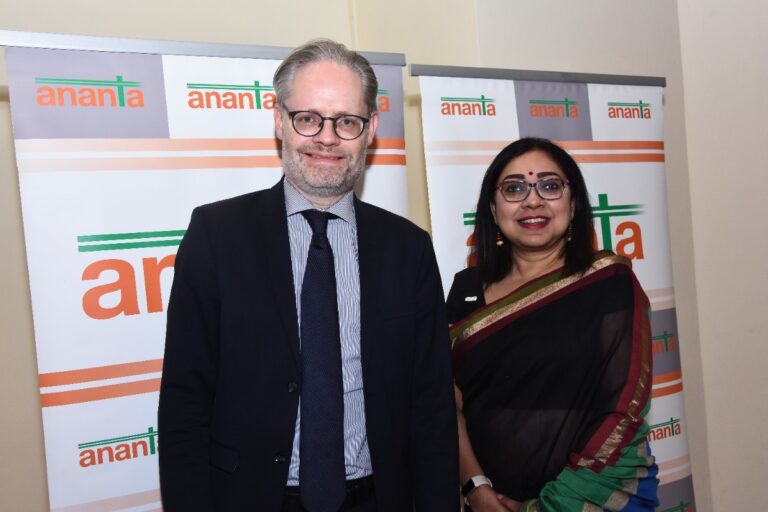Webinar Blog
India and Bangladesh share bonds of history, language, culture, and have witnessed intense high level engagements over the past few years. Prime Minister Narendra Modi’s recent visit to Bangladesh to commemorate the 50 th anniversary of the war of liberation and the centenary year of Sheikh Mujibur Rahman, and his meetings with Prime Minister Sheikh Hasina showcased the deep history the two nations share, the future plans and the challenges ahead. Both countries had committed to further strengthen economic and people to people ties, as well as security cooperation. In the light of growing relationship, Ananta Centre held a digital session on “India and Bangladesh: Re-imagining a Connected Destiny” with H.E. Mr. Vikram K. Doraiswami, High Commissioner of India to Bangladesh chaired by Dr. Naushad Forbes, Co – Chairman, Forbes Marshall; Chairman, Ananta Aspen Centre.
A timely opportunity, 50 th year of India-Bangladesh ties and 75 years of India’s independence.
Decades of sustained engagement- cut the guardian knot of many long-standing problems. The 1971 war was a people’s war to defend the way of life- not an elite level process. Successful mil campaign by Mukti Bahini and Indian army. The fundamental questions of identity are broadly addressed in Bangladesh. India needs to reckon with this and engage with it positively and proactively. There is a natural appreciation for India’s support to Bangladesh among Bangladesh’s people.
Bangladesh has moved ahead rapidly in social and economic terms, passing over Pakistan and India in its overall economic well-being, has 2 nd largest garment industry, average life expectancy is 3 years longer than India, average literacy also higher than India. 36% of workforce in women. India has a great opportunity for active investment, trade and economic relations with Bangladesh.
On Trade and Commerce, the regulatory environment for trade needs to improve in order to leverage opportunities. Connectivity is a prerequisite for trade but poor in this regard. Both countries need to rectify this and improve trade logistics which can transform trade system in both countries. Environment efficient trade is possible if there is improvement in connectivity for both countries.
Bangladesh is keen to source electric power from Nepal and Bhutan, supply diesel from Assam. Both countries need to learn from each other’s development story such as micro- finance and women in workforce. Military and service to service diplomacy. Both countries need leadership level engagement. Furthermore, India needs to change mindset- leverage Bangladesh’s market, production capacity and diversify relations naturally through more economic content.
Today 350 Indian companies registered in Bangladesh with 3.5 billion in FDI. India need to target economic sectors with immediate impact and employment generation like automobiles, food processing and fisheries. CEPA with investment chapter will become a game changer. Connectivity is very important for consistent investment in facilitation of trade. Private container terminals, logistics operators, railways and inland water services are also very significant. India is Bangladesh’s dominant land neighbor. India has a huge opportunity to connect and how both can see huge improvements in trade. India should encourage more investment from Bangladesh in real estate.
Energy is a driver of regional cooperation. So both countries can cooperate in this sector. Also, both countries need to create opportunities for start-ups, tech collaborations, rapid scale up of FINTECH and digital transformations in order to aid poverty alleviations.
Women participation in garment industry has brought many positive social contributions to Bangladesh. India could replicate this success story in Odisha, Chhattisgarh and North- eastern India. Moreover, India should be fully engaged in the Bangladesh development story. India can do everything in Bangladesh such as urbanization at an unprecedented pace. Waste management is another opportunity. India should be part of this as a business solutions provider.
India should step up and make the effort. Opportunities will come if India keep knocking on the doors. India should not get too carried away or caught up with history. Bangladesh is a business opportunity for India. And India should get out of the mindset that everything will be done reciprocally. India should do somethings irrespective of whether Bangladesh do it or not. India should address smaller stuff which facilitates business and movement of people. This will drive relationship beyond political level. It is problematic to look at Bangladesh from political perspective only, India should look at Bangladesh as an economic opportunity and from a more multi-dimensional perspective. Good trade, investment and business will make relations more resilient.
This digital session was a part of a series on “Ambassador Series”
Please watch the full session on YouTube:-























